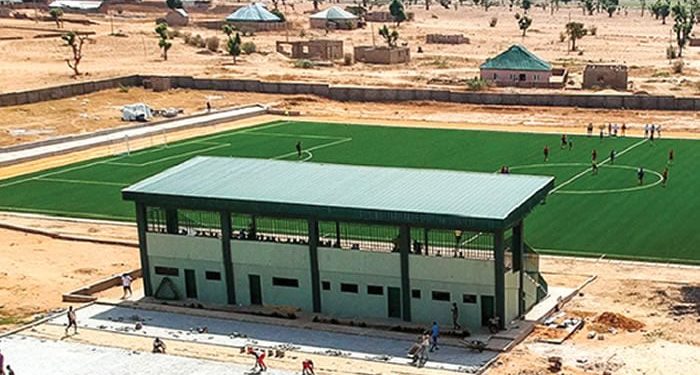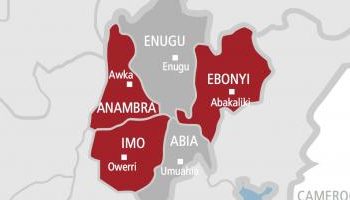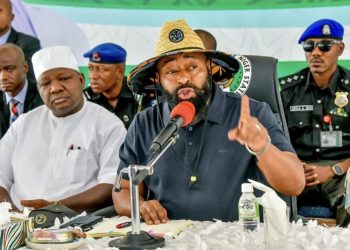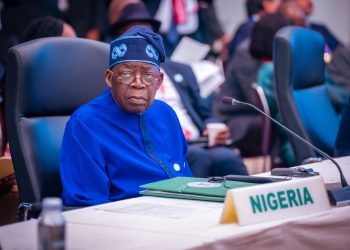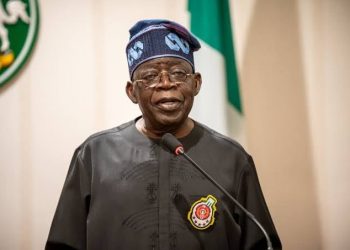FIFA has unwittingly thrown Nigerian football into a storm. Bedlam ensued shortly after the world football governing body uploaded a photograph of the FIFA Forward Project (FIFA Goal Project) in Birnin-Kebbi, the Kebbi State capital, on October 25. The half-finished project provoked public outrage, which has yet to subside.
Pundits and commentators accused the Nigeria Football Federation of corruption, which the federation denies.
FIFA’s initiative is to build mini-football pitches in its 165 national federations. The Kebbi stadium is among the FIFA-funded facilities in Nigeria, with another in Delta State. Under its Forward 2.0 initiative, FIFA provided $1.2 million each to construct two mini-pitches in Delta and Kebbi.
While the half-finished pitch in Kebbi has drawn ire, the one in Delta has barely taken off. The contractor in the Delta case is in court after the NFF terminated the contract over alleged non-performance. The projects were initiated in 2015 and awarded in 2020. The NFF says the COVID-19 pandemic disrupted construction.
The Nigerian public is demanding accountability from the NFF, claiming that FIFA and CAF have given Nigeria about $25 million with nothing to show.
In its defence, NFF’s former president, Amaju Pinnick, said $1.2 million was about N300 million to N400 million in 2020. With the depreciation of the naira, the grant seems huge today.
To get a clean bill, the NFF should be transparent. It should provide accounts of how the grants were spent, the contractors, the reasons for the delays, and the role of FIFA.
Beyond this, the FIFA initiative exposes Nigeria’s huge sports infrastructure deficit – at every level. There are a few stadiums at the grassroots level. The grounds at the state and federal levels do not meet international standards. Unlike in the past, many schools no longer have sports facilities.
A poor maintenance culture compounds the rot.
The infrastructure deficit is pronounced during the qualifiers for the World Cup. In the run-up to the 2026 World Cup qualifiers, CAF disqualified most of the stadiums in Nigeria.
It said stadiums in Enugu, Ibadan, Kano, Kaduna and Port Harcourt do not meet CAF standards, leaving only the 30,000-capacity Godswill Akpabio Stadium in Uyo and the MKO Abiola Stadium certified to host international matches. This calls for a rethink.
Nigerians compare a stadium under construction in Kenya with the mini-pitch in Kebbi. That is far-fetched. Kenya, a notable country in athletics, is spending $300 million on the 60,000-capacity Talanta Sports Stadium in readiness to co-host AFCON 2027. This is a sound investment; the authorities there are putting their money where their mouth is.
Basketball courts dot the landscape of Dakar, Senegal. In the evening, the youth troop out to play basketball there. How many basketball courts are in Nigerian cities?
Nigeria should learn from all this. Without adequate investment in infrastructure, Nigerian sports will continue to nosedive. Nigeria did not qualify for the 2022 World Cup and is struggling to qualify for the 2026 World Cup. The country’s youth teams are having a bad time on the international stage.
Beyond sports, Nigeria has a huge national infrastructure deficit. The World Bank estimates the infrastructure stock at 30 per cent, far below the global benchmark of 70 per cent.
The Bank said Nigeria requires $100 billion annually over 30 years to bring its infrastructure up to scratch.
Entire highways are decrepit; rural roads fare worse.
The Federal Government has not completed the reconstruction of the 127.5km Lagos-Ibadan Expressway since 2004! In that period, Olusegun Obasanjo, Umaru Yar’Adua, Goodluck Jonathan and Muhammadu Buhari had been president. The incumbent, Bola Tinubu, assumed office in May 2023.
Ultimately, Nigeria should deepen private sector investment in sports. For now, state governments own most clubs. Poor funding limits them.
In Europe, football is big. Private clubs own stadiums, built at huge costs. Arsenal, Tottenham, and Everton built brand new stadiums. In Spain, Real Madrid and Barcelona have done major reconstruction at the Santiago Bernabeu and Camp Nou. Atletico Madrid opened the reconstructed Wanda Metropolitano in 2017. In Italy, Inter Milan and AC Milan are about to build a new San Siro that will seat 71,500 fans.
Nigeria must follow these examples to make a difference.
Additionally, Nigeria can attract the youth to sports arenas by improving its security.

